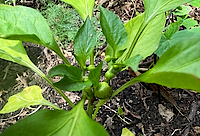
Yummy!

The vegetable garden is now planted and starting to bear fruit, surprisingly early.
The bittersweet benefit of global warming is getting berries on tomato plants in May.
I often gaze at the borders, wondering why the summer perennials haven't bloomed yet, only to remember summer hasn't even started, neither in the garden nor on the calendar.
The eggplants, known for their long seed to harvest season of over 100 days, might get a decent crop this year, with the early start they had.
It rained a lot, which helped the young plants get settled in their spots. They are undergoing a growth spurt now, happy with the good soil and bright sunshine, pushing out new foliage, flowers and fruit as fast as they can.
A squirrel missed a peanut, which sprouted and is now gracing my vegetable border. I did not know peanut flowers were so beautiful, maybe I should grow some on purpose next time.

Companion Planting

Plants are choosy about the company they keep: they thrive in the presence of certain species and become absolutely miserable in close quarters with others.
In the gardener's toolkit, companion planting is an essential technique, along with plant rotation, staggered crops and succession planting.
Think of it as planning seating arrangements for a large wedding.
The classic combinations will sound familiar, plant them together and they'll reap synergistic benefits, especially when grown in containers.
Corn, beans, and squash, known as the three sisters, thrive in each other's company.
Chives, parsley, and basil improve the flavor and health of tomatoes, peppers, and eggplants.
Cucumbers love dill, in the garden as well as in the kitchen, and the same goes for garlic and potatoes.
Most importantly, some plants dislike each other greatly, and you should never plant them together.
Tomatoes have a strong aversion to potatoes, cabbage, and corn, onions and beans make a poor combination, and growing cucumbers and squash together results in intense competition and limited crop output.
